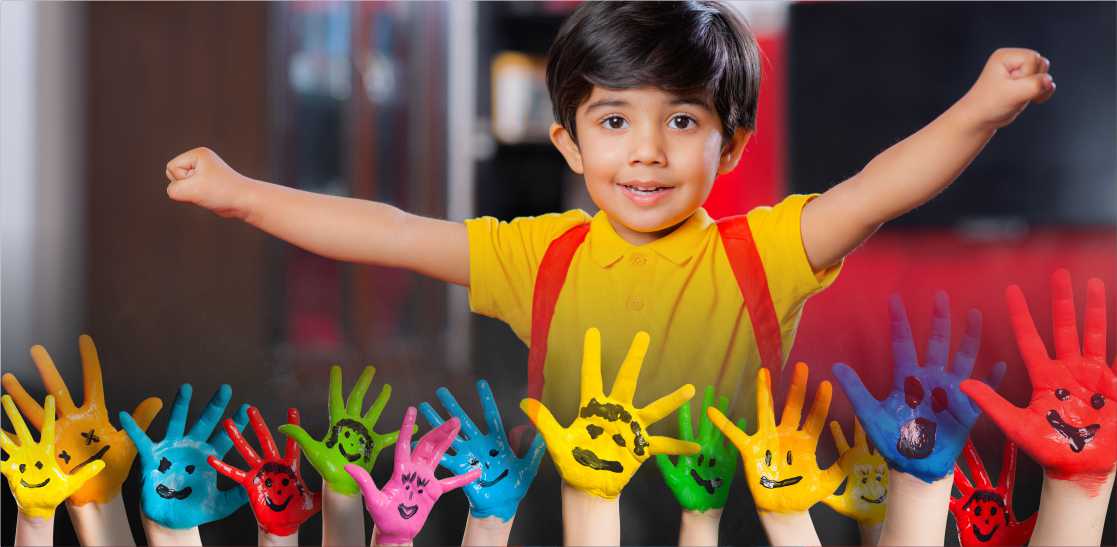![]()
Social-emotional learning (SEL) is crucial in early childhood education as it lays the foundation for children’s overall development and future success. Here are ten innovative approaches to SEL in early childhood education:
Social-emotional learning (SEL) is a cornerstone of early childhood education, pivotal for children’s academic achievements and overall flourishing. At our institution, we integrate SEL into our curriculum, recognising its significance in fostering emotional intelligence and social skills.
Educators are committed to innovating SEL practices and equipping children with emotional regulation, relationship-building, and responsible decision-making tools. Listed below are ten innovative strategies that shape SEL in our early childhood educational programme:
1. Emotion coaching: Educators are coached to recognise and respond to children’s emotions effectively. Emotional coaching techniques assist children in understanding and regulating their feelings, fostering empathy, self-awareness, and interpersonal relationships.
2. Mindfulness practices: Mindfulness activities, such as deep breathing, simple yoga asanas, and guided imagery activities are incorporated into daily routines to improve emotional control and minimise stress. These daily routines also enhance children’s attention span and emotional resilience.
3. Conflict resolution: Teaching children conflict resolution skills through role-playing, storytelling, and problem-solving activities empowers them to navigate social connections (i.e. collaboration and interpersonal skills), and promotes assertive communication.
4. Culturally responsive teaching: Recognising the diverse backgrounds of the learners, our educators embrace culturally responsive teaching practices. By infusing diverse perspectives, stories, and traditions into the curriculum, children learn empathy, respect, and appreciation for cultural differences.
5. ‘Playful’ learning: Play-based educational environments offer significant opportunities for social-emotional learning. Through cooperative games, role-playing scenarios, and collaborative projects, children learn to responsibly engage in group interactions, share resources, and manage conflicts.
6. Development of executive functioning skills: Our curriculum incorporates activities that improve memory, cognitive flexibility, attention, and planning, which in turn promote academic success and overall well-being. These skills and abilities are critical for children’s development, thereby enhancing their ability to organise and prioritise tasks (follow daily routines), problem-solve, and regulate their behaviour.
7. Cultivating a positive self-image: Promoting a positive self-image and self-esteem helps children gain confidence and resilience. Affirmations, positive reinforcement, and opportunities for self-expression help educators motivate children to embrace their strengths, celebrate their accomplishments, and develop a healthy sense of self-worth.
8. Creating safe spaces for children: When schools provide safe environments, offer mentoring, adopt teaching practices such as safe/unsafe touch, and recognise stranger danger for children, it serves as the backbone for their physical and emotional well-being.
9. Building resilience: Resilience is the ability to rebound from obstacles and failures, which serves as a crucial skill for facing the challenges that life presents. Our educators assist children in building resilience and fostering a growth mindset by providing them with the opportunity to learn from setbacks and develop determination and perseverance.
10. Parent and community engagement: The positive outcomes of social-emotional learning can amplify when it extends into the home. Workshops, family events and engagements, and community partnerships create a support network that reinforces social responsibility, fairness, kindness, and helpfulness toward others.
To summarise, the integration of nature-based learning and social-emotional development in early childhood education represents a paradigm shift towards approaches that value children’s holistic well-being.By encouraging nurturing connections with nature and developing emotional intelligence, educators lay a strong foundation for lifelong learning. As educators, parents, and stakeholders, we must embrace these trends and lifelong success.
